- Home
- Todd Strasser
Kill You Last Page 9
Kill You Last Read online
Page 9
Mom came into the kitchen in her robe, glanced at the TV as if she already knew what was on it, and poured herself a cup of coffee.
“Where’s Dad?” I asked.
“He left early.”
“Why?”
“Because of all those people outside.”
Oh, right, of course. Now that an actual body had been found, there was probably more media than ever. Having gone straight to the kitchen, I hadn’t yet looked out front that morning.
“Can’t we do something?” I asked. “What if we hire a private detective to help prove Dad is innocent?”
Mom gazed at me with sad eyes. “Why do you think a private detective could find something that all these other detectives can’t find?”
“Because they’re all too focused on Dad,” I said. “A private detective could take a different approach. Like focus on something or someone else.”
“Oh, darling, I’m sure they’re already doing that,” Mom said, then paused and studied me as if she’d just thought of something. “It’s best if we stay out of it. If your father is innocent, I’m sure they’ll—”
“If he’s innocent?” I repeated, cutting her short. “Mom, how can you say that? Of course he’s innocent.”
Mom’s eyes widened as if she were as surprised by what she’d said as I was. “Oh, I’m so sorry, darling, that’s not what I meant.”
“You sure?” I asked.
She smiled reassuringly. “Yes.”
A little later, back upstairs, I talked to Roman about the dead girl in Scranton. “This is going to turn the heat way up on my dad.”
“Not necessarily,” she said.
“How can you say that? He’s the prime suspect. As far as I can tell, he’s the only suspect. And like you said, lie-detector tests don’t really count. The only way anyone’s going to believe he’s innocent is if I prove he is.”
“If you prove it?” Roman replied, alarmed. “Wait a minute, Shels, they’ve found a body with her hands and feet tied up. There’s a real murderer out there somewhere. This isn’t Nancy Drew anymore. You have to stay out of this.”
“But there’s definitely something strange about Gabriel,” I argued. “I mean, when it comes to those missing girls, he’s got zero empathy. All this means to him is that he’s not making any money. It’s almost like he’s a sociopath.”
“Thanks for the diagnosis, Dr. Sloan,” Roman said, making no effort to hide the sarcasm. “But if Gabriel’s involved in this, I don’t have to tell you why going anywhere near him is the totally worst idea ever. You tried it once; it didn’t work. That’s got to be the end of it.”
She was right, but she was also wrong.
And then I had an idea and realized I had to end the conversation. I let out a big sigh and said, “I guess you’re right.”
“I am?” Roman sounded surprised.
“Uh-huh.”
“You’re not just saying that to blow me off?” she asked suspiciously.
“No, it’s just so frustrating,” I said, pretending I wasn’t completely eager to get off the phone. “You know how it feels when you want to do something and there’s nothing you can do.”
Roman assured me that things would work out sooner or later, then asked what my plans were for the rest of the day.
“Catch up on schoolwork,” I lied. “It’s really been hard to focus, and I’m way behind.”
As soon as I got off with Roman, I called Whit.
“Hey.” He sounded surprised to hear from me.
“I have an idea,” I said. “An angle we should pursue.”
“We?”
“Look, if you really want to get to the truth, you’re going to need me. I know these people. I—”
“Stop,” he said. “Not on the phone. I’m not saying it’s tapped or anything. I just don’t like taking chances.”
“But we’re not talking about anything people don’t already know about.”
There was a pause, then Whit said, “Maybe you’re not.”
Was I imagining it, or was there something about the way he said that that meant he did know something he didn’t want anyone else to know about?
“When can you meet?” I asked.
“It’ll have to be soon. I have to get together with a friend later.”
We agreed to meet at a McDonald’s halfway between Sarah Lawrence and Soundview. As I threw on some clothes, I found myself wondering who Whit’s friend was. Not that I really cared. It was just curiosity. Like, what kind of friends did he have?
Downstairs, Mom was still in the kitchen, having coffee.
“Where are you going?” she asked.
“Starbucks with Roman,” I said without stopping.
At McDonald’s I told Whit about Gabriel and his strange attitude toward the missing girls. Whit listened quietly, but I sensed he had something else on his mind.
“That’s interesting,” he said when I’d finished.
“You only half listened,” I said.
He raised his eyebrows, as if surprised that I’d noticed, then leaned forward and pressed the tips of his fingers together. “Can you swear to keep a secret?”
“Absolutely.”
He spoke barely above a whisper. “The woman who works for your father and calls herself Janet Fontana is not Janet Fontana.”
I stared at him, not sure I understood.
“Janet Fontana was a bookkeeper for a plumbing supply company in Salem, Oregon. She died in a car accident about two years ago, just a month or two after her twin sister, Jane, was released from a California prison where she’d served eighteen months for an Internet scam involving credit card fraud. It appears that when Janet’s death certificate was issued, Jane doctored it to remove the t so it looked like Jane, not Janet, died.”
“You’re saying that Jane took over her sister Janet’s identity?” I guessed.
“Exactly. The two sisters looked similar enough, and Jane could easily use Janet’s driver’s license. She moved across the country to Soundview and used her sister’s IDs and the money in her Salem bank account to open a new account here, get credit cards, rent an apartment, the whole works.”
It took a moment to absorb the news. Then I said, “What about the police?”
“Unlike her sister, Janet Fontana was a law-abiding citizen. I assume the police here asked the police in Salem to run a records check and it came up clean. No criminal record. Nothing that would cause the police to want to investigate any further.”
“So when Jane applied for the job as Dad’s office manager, she used her sister Janet’s résumé,” I concluded.
“Uh-huh.” Whit nodded.
That explained how someone so disorganized could be hired to be an office manager.
“How … did you find this out?” I asked.
“The Internet,” Whit said. “I was digging around and came up with an obit from the Salem Statesman Journal for Janet Fontana. I made a few phone calls, and when someone told me that Janet had a twin sister named Jane, who’d come to town for a few days after Janet died, I began to put the story together. Pretty simple, actually. It just took a lot of time and searching.”
He paused and waited for me to digest the news. Then he said, “By the way, you might be interested to know that Mr. Kissy Face was once arrested for shooting a BB gun at a neighbor’s window.”
“You also found that on the Internet?” I guessed.
Whit nodded.
“So what else do you know about Janet? I mean, Jane?”
“She has a pretty long California police record. It started with small-time stuff like shoplifting and petty theft, but then she graduated to more serious crimes.… Internet scams. Felonies. That’s why she did jail time.”
In my mind I pictured Janet/Jane, and how scattered and moody and temperamental she could sometimes be.
“Did your dad ever say anything?” Whit asked.
“Never. Why would he hire someone like that if he knew?”
Whit tapped a
finger against his head as if to say, “Think about it.”
To help him with the modeling scam …
“Oh God,” I moaned miserably.
“But that’s only if he knew who she really was,” Whit stressed. “Any idea how long she’s been working for him?”
“A couple of years at least.”
Whit unfolded a piece of paper with a column of print on it. I watched his eyes scan down, then stop. His forehead furrowed. “Could you be a little more precise?”
Strangely, I could. “Two years … three months … four days.”
Whit cocked his head curiously.
“It was the week I turned sixteen. I wanted him to take me to get my driver’s permit, but he couldn’t leave the studio early because he had to break in the new office manager. I wanted to kill her.… I mean, in a manner of speaking.”
“Why couldn’t your mom take you?”
“She was helping him at the studio. He’d just moved it from the city. There was tons to do.”
“Just curious, why’d your dad decide to move his studio up here from New York?” Whit asked.
That was a good question, and I wasn’t sure I knew the answer. It had happened very quickly, and I’d always assumed that he felt he could do just as well in Soundview, but without the commute. But when he’d been in the city, there’d been lots of work and he’d never had to resort to shooting menus.
“I don’t really know,” I said.
Whit scowled and looked at the paper. The lines in his forehead deepened. “You sure about that date?”
“Totally. I was so PO’d about not being able to get my learner’s permit until the weekend.”
“So Janet had only been living here in Soundview a few weeks when she got hired,” Whit said.
“I’m sure Dad didn’t know who she really was,” I said. The alternative was far too upsetting to consider. If Dad knew who she really was, then once again he’d lied to me. He’d said he’d fallen into the scam gradually and by accident. But if he’d knowingly hired Janet, that implied he’d known exactly what he was doing from the start.
Then I thought of something else. “But why would that make Janet a suspect? Isn’t it a stretch to go from Internet scams to murder? And what would her motive be for killing the girls?”
“Think about it. She was living here under a false identity. She knew that if the girls complained to the police about the scam, she might get caught. And with her record, if she got caught for identity theft, she’d be going straight back to prison.”
I thought back to the day the police first came to Dad’s studio and how agitated Jane/Janet had been.
“But there were so many girls who fell for the scam,” I said. “How does killing just three keep her out of prison?”
“Maybe they were the only ones who threatened to go to the police after they realized they’d been scammed. I mean, you’ve probably got some girls who didn’t even realize it was a scam, and some girls who figured it out and just shrugged their shoulders and moved on. But there had to be a few who got mad and demanded their money back, or threatened to turn your dad in.”
“And those would be the ones Janet was concerned about,” I said. The muscles in the sides of my head began to tighten and throb. Had Whit really figured out who the killer was? If it wasn’t my father, I should have felt elated, right? But if he’d knowingly wanted Janet to help in the scam, then wasn’t he indirectly responsible for what happened to those girls? I felt torn with mixed emotions. And there was one more question: “So why haven’t you written a story about it?”
Whit gazed at me with his steady green eyes. “I’m going to. But I’d feel a lot better if I knew what your dad knew and when he knew it. Because once this story gets out, everyone’s going to think that he hired her precisely because she has experience with scams. If that’s true, then the public has a right to know. But if it’s not true, I’d like to be able to say so.…”
“Because you don’t want him to be unjustly accused?” I asked.
Whit nodded, and I had to appreciate him for that, because any other journalist would probably have run the story immediately. It was a good scoop and would undoubtedly bring glory to whoever wrote about it first.
“Any ideas?” he asked.
“The answer could be somewhere in the studio,” I said.
“But the police have already been there twice. They must have seen all kinds of papers and records.”
Whit had been honest with me, and now I was going to be honest with him. “Yes, but both times, they were in the office … Janet’s office.”
He gave me an uncertain look.
“Dad has his own files. He keeps them in his photo studio. If the police haven’t found Janet’s fake résumé yet, then it might be there. It’s the only way I can think of to prove that Dad hired her without knowing about her criminal background.… How long are you willing to hold off on publishing this story?”
His forehead wrinkled. “It’s hard to wait, Shelby. I feel like at any moment someone else is going to figure out what’s going on.”
“Would you wait until tonight?” I asked.
He gazed back at me. “Only if you let me go with you.”
Chapter 24
THAT EVENING I slipped on a light jacket. “Going out, Mom,” I called, then went out the door.
I’d just gotten to my car when I heard, “Shels?” Her silhouette was in the doorway. “Where are you going?”
“Just out.” I immediately regretted that I hadn’t been more specific. It sounded made up and feeble.
“Out where?”
“To Roman’s. I won’t stay late.”
Mom was quiet. I couldn’t see her expression. She closed the door.
Whit was waiting for me in the dark parking lot behind the studio, with two small flashlights. He gave me one. “You have the keys?” he asked.
I nodded, and we walked toward the back door. “Doesn’t it feel like we’re in a movie?” I whispered.
“All we’re doing is going into your dad’s studio.”
“At night with flashlights?”
I was just about to slide the key into the back-door lock when I noticed a flat piece of plastic stuck in the doorjamb. The kind of plastic that milk containers are made out of. Someone had put it there to keep the door from locking.
I stiffened and whispered to Whit: “Think someone’s in there?”
He reached past me and slowly pushed open the door. “Let me go first.”
I followed him inside, my nerves tingling and heart rattling. The building was quiet and dark, and we flicked on our flashlights. As we made our way slowly down the hall toward the photo studio, Whit whispered, “Usually, when someone puts something like that in a door, it means they’ve left and want to be able to get back in later. So let’s make sure we keep our ears open in case they come back.”
Still, he shone his flashlight into the kitchenette, the broom closet, even the bathroom, just to be sure. If anyone had been there, they’d gone.
We went into the photo studio, and I swung my flashlight at the cabinets lining the wall.
Thump!
The unexpected sound came from behind me. I spun around just as Whit collapsed to the floor … and a dark figure sprinted out of the studio.
Chapter 25
“WHIT!” I KNELT beside him. He was sprawled on the floor, his eyes squeezed shut and a grimace of intense pain on his face. His hand went to the back of his head and he moaned. “Aw, jeez …”
He tried to look at his hand in the dark. I shone my flashlight on it. There was no blood. Next I aimed the flashlight through the doorway to see if the person who’d hit him was still there.
But he—or she—was gone. I turned back to Whit, who’d propped himself up on one elbow. “Are you okay?”
“I guess.” He pushed himself up to a sitting position, touched the back of his head again, and winced. “Ow! Man, that hurts. You sure I’m not bleeding?”
I looked
at the back of his head. A bump was already starting to bulge. “Is it bad?”
“Worse than you’d imagine from watching TV.”
“Whoever it was must have been hiding behind the door.”
“Male or female?”
“I couldn’t tell. It happened too fast.”
Whit touched the back of his head again. “You wouldn’t have any ice, would you?”
“Yes. Be right back.” I went down to the kitchenette and put some ice in a plastic bag. When I got back to the photo studio, Whit was aiming his flashlight at the cabinets. I gave him the bag, which he pressed gently against his head.
“Thanks,” he said. “Guess we better start looking.”
That caught me by surprise. “You sure?”
“Yeah. Believe me, it’s not the first time I’ve had my bell rung.”
“Football?”
“Low doorways. I’m always banging my head.” He slowly pushed himself up to his feet.
“Shouldn’t we do something about what just happened? I mean, call the police or something?”
“And say what? That we were breaking in and I got beaned by the person who’d broken in ahead of us?”
“We didn’t break in,” I said. “I have a key.”
“And when they ask what we were doing here in the middle of the night?” he asked, crossing to the first file cabinet.
I didn’t have an answer for that.
“Whoever it was is gone,” Whit said as he pulled open a cabinet and shone his flashlight inside. “All we’d be doing is drawing attention to ourselves. I’m supposed to be writing stories, not making myself the subject of them.”
The cabinet was filled with light reflectors, filters, and colored gels—but no files. We started to look in other cabinets, but they were also filled with photographic equipment.
“What made you think your dad kept files in here?” Whit asked.
“I’ve seen them,” I said, swinging the flashlight around the studio.

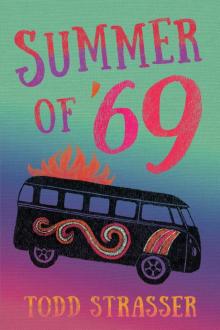 Summer of '69
Summer of '69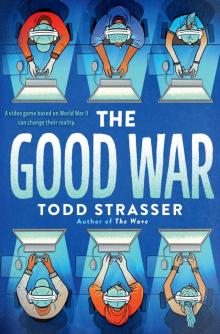 The Good War
The Good War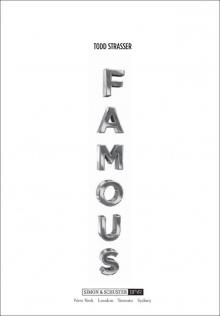 Famous
Famous If I Grow Up
If I Grow Up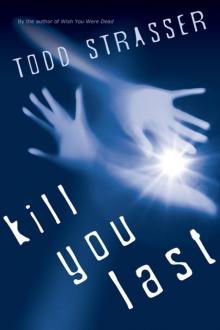 Kill You Last
Kill You Last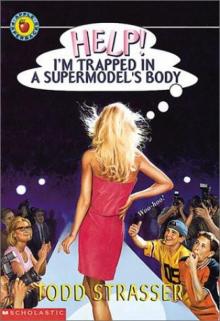 Help! I'm Trapped in a Supermodel's Body
Help! I'm Trapped in a Supermodel's Body Price of Duty
Price of Duty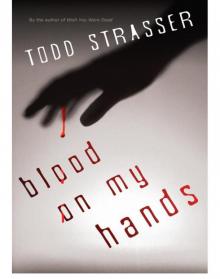 Blood on My Hands
Blood on My Hands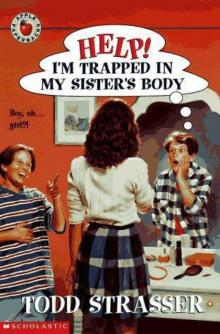 Help! I'm Trapped in My Sister's Body
Help! I'm Trapped in My Sister's Body sidewayz glory
sidewayz glory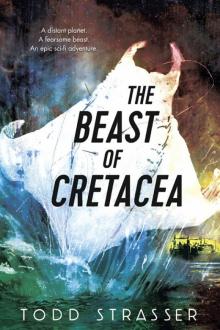 The Beast of Cretacea
The Beast of Cretacea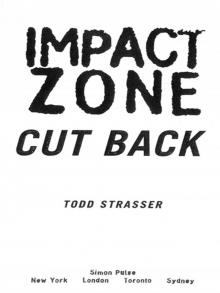 Cut Back
Cut Back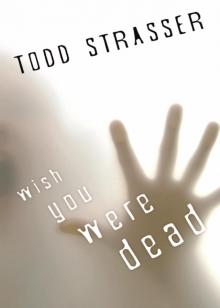 Wish You Were Dead
Wish You Were Dead The Wave
The Wave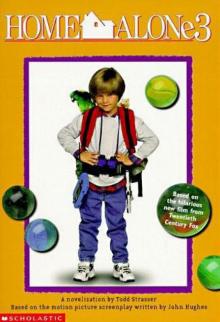 Home Alone 3
Home Alone 3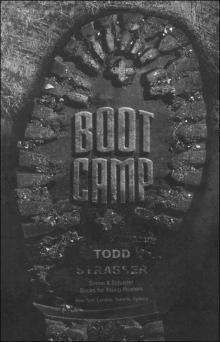 Boot Camp
Boot Camp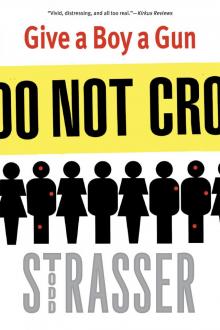 Give a Boy a Gun
Give a Boy a Gun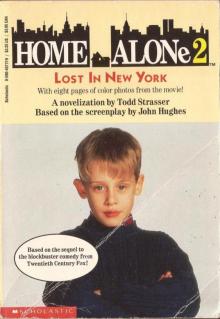 Home Alone 2
Home Alone 2 The Shore
The Shore Can't Get There from Here
Can't Get There from Here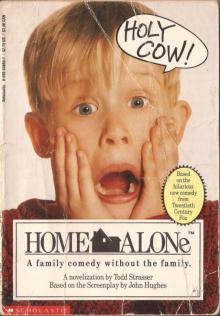 Home Alone
Home Alone Close Out
Close Out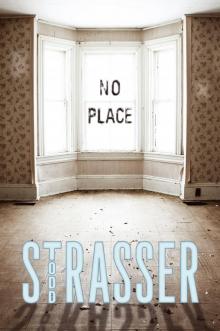 No Place
No Place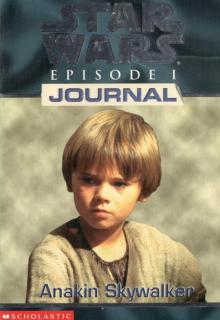 Star Wars - Episode I Journal - Anakin Skywalker
Star Wars - Episode I Journal - Anakin Skywalker